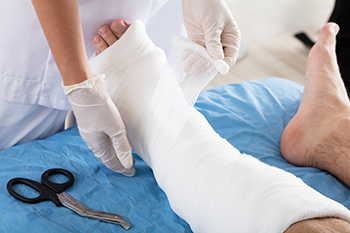
Offloading devices are used to reduce pressure on specific areas of the foot where ulcers have formed, helping to prevent further damage and support healing. Offloading devices typically shift body weight away from the wound, which decreases friction and mechanical stress. Total contact casts provide the highest level of pressure relief by fully immobilizing the foot and ankle, making them effective for deep or persistent ulcers. For patients needing more flexibility, removable cast walkers not only offer protection but also allow access for wound inspection. Custom orthotics and specialized shoes with cushioned soles are often used for less severe ulcers or during the later stages of healing. Offloading sandals and pneumatic boots may help with minor ulcers by offering light support and comfort for indoor use. Choosing the right device depends on the size and depth of the ulcer, the location on the foot, and the patient’s ability to move independently. If you have foot ulcers that require wound care, it is suggested that you schedule an appointment with a podiatrist to see if offloading devices may work for you.
Wound care is an important part in dealing with diabetes. If you have diabetes and a foot wound or would like more information about wound care for diabetics, consult with Dr. Tupper from Coshocton Foot Health Center. Our doctor will assess your condition and provide you with quality foot and ankle treatment.
What Is Wound Care?
Wound care is the practice of taking proper care of a wound. This can range from the smallest to the largest of wounds. While everyone can benefit from proper wound care, it is much more important for diabetics. Diabetics often suffer from poor blood circulation which causes wounds to heal much slower than they would in a non-diabetic.
What Is the Importance of Wound Care?
While it may not seem apparent with small ulcers on the foot, for diabetics, any size ulcer can become infected. Diabetics often also suffer from neuropathy, or nerve loss. This means they might not even feel when they have an ulcer on their foot. If the wound becomes severely infected, amputation may be necessary. Therefore, it is of the upmost importance to properly care for any and all foot wounds.
How to Care for Wounds
The best way to care for foot wounds is to prevent them. For diabetics, this means daily inspections of the feet for any signs of abnormalities or ulcers. It is also recommended to see a podiatrist several times a year for a foot inspection. If you do have an ulcer, run the wound under water to clear dirt from the wound; then apply antibiotic ointment to the wound and cover with a bandage. Bandages should be changed daily and keeping pressure off the wound is smart. It is advised to see a podiatrist, who can keep an eye on it.
If you have any questions, please feel free to contact our office located in Coshocton, OH . We offer the newest diagnostic and treatment technologies for all your foot care needs.
